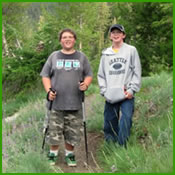Shaq's
Big Challenge Falls Short of Solving Youth Obesity
 Meet
Stuart and Devan. Late July they participated in our Physical Education
Summer Camp, and I had the pleasure of joining them on a day hike.
Ten minutes into the hike Stuart didn't think he was going to make
it. For him, and probably the other kids who don't hike regularly,
it was a pretty tough challenge. Meet
Stuart and Devan. Late July they participated in our Physical Education
Summer Camp, and I had the pleasure of joining them on a day hike.
Ten minutes into the hike Stuart didn't think he was going to make
it. For him, and probably the other kids who don't hike regularly,
it was a pretty tough challenge.
We started at 4500 feet and planned to ascend to 6500 feet. Quickly
into the hike Stuart was hot, sweaty, and breathing heavily. He
had to stop regularly for water breaks and to catch his breath.
To his great credit, nearly 2 hours later, he and 22 others reached
the top of the pass to enjoy some breathtaking mountain scenery.
It was a great personal success for Stuart…and this brings
me to my thoughts about the latest reality TV series intent on conquering
obesity - Shaq's "Big Challenge."
To read more about this effort purported to "help youth live
a healthier lifestyle" visit the links on our homepage under
"News." Briefly explained however, basketball star Shaquille
O'Neal is the celebrity figurehead of a reality TV show in which
a group of overweight youth attempts to lose weight and get in shape.
If this sounds familiar, then you may have read my editorial on
the pelinks4u homepage last October
in which I reported on a TV show I'd recently seen while in England.
Here a celebrity English soccer star took on a similar challenge
to the one Shaq is now tackling. Although well intentioned, it ended
disappointingly. Similar to the "Big Challenge," the focus
of the British show attempted to solve youth obesity from a conditioning
exercise perspective.
The British kids, like their American counterparts, were subjected
to a regimen of intense physical exercise designed to lose pounds
and improve physical fitness. Awed by their celebrity mentor they
began enthusiastically, but quickly rebelled, expressing dislike
of the often harsh physical exercises they were forced to perform.
In the "Big Challenge," similar to the British program,
the physical activity the kids are exposed to is led by a muscular
exercise specialist for whom push ups, sit ups, and lap running
are probably a joy. Not so, I suspect, for overweight kids who find
walking strenuous and physically taxing. As I wrote last year, we
should mandate that anyone who conducts exercise programs for obese
students should first have to don a 20-30 pound weight belt, and
do the same exercises he or she plans for kids.
If we simply want to get obese kids to lose weight, the best way
is surely to simply lock them up in a controlled environment where
we limit their diet, and require them to expend a specific number
of calories before eating. Scientists looking at treatment effects
do this all the time in their experiments using laboratory rats!
Why we don't do this with humans is obvious. Less obvious, apparently,
is why taking overweight kids and putting them in rigorous conditioning
programs is almost certainly destined to fail.
Why would young people persist doing things that are painful? Even
in athletics we've learned to dismiss the old adage of no pain equals
no gain. How to help overweight people to lose weight may have no
easy solutions, but one thing is certain - we can't do it through
punitive measures. And that's why Shaq's effort will fail.
Of course, not everything about the "Big Challenge" was
bad. Spreading the message on national television about the health
hazards associated with children's obesity moves us closer to discovering
workable solutions. But what those of us in physical education should
reflect upon is the fact that nothing about the "Big Challenge"
involved a connection with public school physical education. In
fact several times inference was made to the show's physical activity
program being a "physical education" program.
As far as I could tell no professional physical educator had any
involvement in the show. Unfortunately, I fear that some of the
millions of viewers might interpret what they saw as illustrative
of today's public school PE. It would be too bad for all of us if
that were the image that sticks.
Instead of being critical, I wish I could reveal the "right"
way to solve children's obesity. I can't, but I do feel like I did
learn some lessons from observing my young hiking friends Stuart
and Devan. As I mentioned, Stuart's hike almost ended soon after
the start. He was ready to stop, and obviously doubted his ability
to complete the hike. He did stop many times, and even speculated
on turning around when we were within sight of the summit.
But with more encouragement he continued on and made it. It was
quite an achievement. The entire group congratulated him and he
was clearly proud of himself. Interestingly, on the descent he took
off and I didn't see him until we were back at the vans.
The point I want to share though, is that Stuart had several things
going for him in our effort to get him active. First, he had the
opportunity. The hike was scheduled into his day, and he didn't
need to make any decision about whether or not to be active. Second,
the activity demanded significant physical effort, but it was presented
as a challenging but enjoyable physical activity, and not as a repetitious,
boring, or painful physical exercise. Third, we modified the activity
to increase Stuart's chances of being successful.
continued top of next column
|



